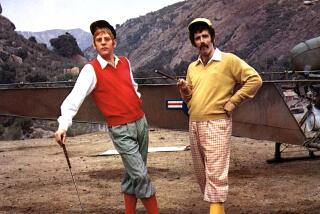A remembrance of Charles Durning: Just beneath the surface
- Share via
In 1985 I began working with producer Joseph Papp on “Free for All,” an oral history of the celebrated New York Shakespeare Festival/Public Theater. I ended up interviewing more than 160 individuals, including actors known for their powerful personalities, like James Earl Jones, Tommy Lee Jones and George C. Scott. But no one I talked to made more of an impression than Charles Durning.
Durning, who died Dec. 24 at age 89, appeared in numerous plays and films, and he was equally at home in dramas like “That Championship Season” and “Dog Day Afternoon” or comedies like “Tootsie.” But Durning in person was a much more compelling and complicated man than even his wide-ranging résumé indicates.
I ended up talking to Durning for quite a while, upward of six or seven hours spread over several days in his Manhattan apartment. This was partly because of the key role Papp and the Shakespeare Festival had played in his career and partly because Durning was such a consummate storyteller — witty, incisive, profane — that you didn’t want him to stop talking.
PHOTOS: Notable deaths of 2012
Here he is, for instance, talking about going to a hospital in costume after getting accidentally injured during a 1970 Shakespeare in the Park production of “The Wars of the Roses”: “We went into the emergency room and there’s a guy who’s been shot, another guy who’s been stabbed in the stomach, and a third guy that had part of arm torn off by a dog. We walk in, both dressed in skirts — miniskirts, in fact — and sandals and holding hands, and they’re all looking at us kind of strangely. As a matter of fact, the guy that had his arm torn got up and moved about two seats away.”
Durning did dozens of Shakespeare productions for Papp — he once compared notes with Albert Finney and realized he’d done more Shakespeare — and he remembered being a scrambling actor in 1962 when he got a note from Papp.
“So I called him and he said, ‘Do you know Julius Caesar?’ And me, always ready with that idiot wit that cost me many a job, said, ‘Not personally.’ There was a silence on the other end, like he thought maybe he’d made a mistake.”
That sharp wit was ever present with Durning, but what was intriguing about him were the different colors of his personality. He was charming and genuinely good-hearted, but there was always, and unexpectedly, an air of familiarity with violence about him.
It’s not that Durning was in any way threatening — he was just the opposite — but you could not talk to him or the people who knew him without hearing about the intense violence he had been a part of during World War II. The specifics didn’t become public until fairly recently, but everyone talked about it, even Durning himself. There was no one whose bad side you less wanted to be on.
Costume designer Theoni Aldredge expressed this dichotomy best. “Don’t muck around with Charles,” she said. “Charles is the most patient human being walking, the angel of the world. But do not step on the 10th toe. The nine don’t hurt. The 10th, watch out because that is a man that has been tortured — he was in a war, it wasn’t easy — so don’t do that. Charlie can be violent.”
Durning was not a small man, but he was remarkably nimble and, as he said himself, “I felt very secure about how to handle myself. I had boxed a little bit. I was doing judo before anybody knew it existed in this country. So I used to walk Joe out of the park at night, and any time there was an argument or a confrontation, I would go with him.”
PHOTOS: Notable deaths of 2012
As he matured as an actor, Durning was able to call on his wartime experiences to inform his work. Here he talks about his acting in a 1970 production of Dennis J. Reardon’s “The Happiness Cage”:
“I had a scene with Marty Sheen where I was supposed to attack him. I hit him with a chair, and I hit him with a table, but I was completely under control. Because I’d had some war experiences, and sometimes you revert, Marty thought I was gone, he thought I was a little bonkers. He asked me under his breath during a couple of performances, ‘Are you all right?’
“During one rehearsal, Joe had to move back about five rows from the first row, it was too brutal. He said to me, ‘I would love to see you lose your temper one time,’ and I said, ‘No, you don’t want to see that, Joe.’”
“Charlie scared me in that play,” was Papp’s memory of the production. “With all that jollity and joviality, there is tremendous rage in him. I’m sure he was an excellent soldier. I’m sure he didn’t hesitate to kill anybody, because he had that in him.”
One quality of Durning’s was unmistakable: his unswerving loyalty. He recalled once asking Papp, “How do you know who your friends are?” and the producer’s answer fit Durning to a T:
“He said, ‘When you’re in deep trouble, and your back is to the wall, when you look to your left and your right, who do you want alongside of you?’ And I said, ‘Boy, it cuts it down considerably.’ He said, ‘Right away.’”
PHOTOS AND MORE
VIDEO: The making of ‘Argo,’ ‘Les Miz’ and more
VIDEO: Holiday movies - A video guide
PHOTOS: NC-17 movies: Ratings explained
More to Read
Only good movies
Get the Indie Focus newsletter, Mark Olsen's weekly guide to the world of cinema.
You may occasionally receive promotional content from the Los Angeles Times.











